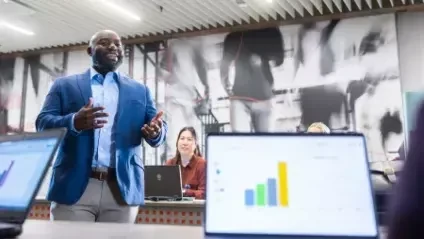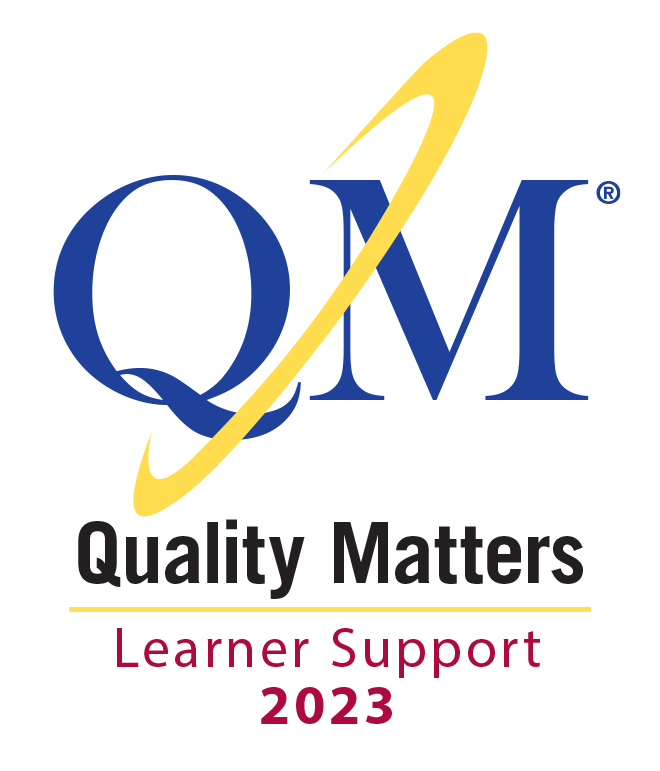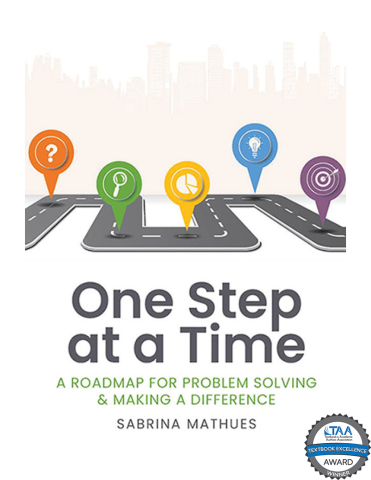Questions? Request Information
Prepare to Overcome Business Challenges
Build a repository of skills in the modern business environment with an online Bachelor of Arts in Business Information Systems from the University of Arizona Global Campus (UAGC). This program enables you to understand the interaction, planning, development, and operations of information systems and information sharing within a business or organization.
Your online business information systems courses focus on information technology planning, networking, e-business strategies, strategic data utilization, and business management. You’ll also develop your skills in problem-solving and leadership in designing, developing, and implementing new or existing information systems within businesses and organizations.
Upon completion of your business information systems degree, you will be able to:
- Apply analytical, logical, and critical thinking abilities in the development of effective information systems solutions
- Evaluate information systems and enterprise solutions appropriate to meet presented business challenges
- Compare and contrast the local and global impact of computing on individuals, organizations, providers, and society
- Develop alternative information systems solutions appropriate for addressing business problems
- Evaluate processes that support the delivery and management of information systems within the business application environment
- Apply knowledge to make responsible decisions when addressing professional, ethical, legal, and social issues and responsibilities relevant to the information technology discipline
- Employ collaborative team skills to accomplish a common goal
UAGC Award-Winning Curriculum
Military Students $250.00/credit
Undergraduate Courses $460.00/credit
Technology Fee** $115.00/course
Books and Other Class Materials** $125.00/average per course
Graduation Fee $150.00
Total Program Cost See UAGC Catalog¹
¹Keep in mind that this figure doesn’t factor in any potential discounts, partner benefits, or impact of accepted transfer credits, if eligible.

UAGC offers enrolled students access to ScholarshipUniverse, a platform that tailors external scholarship opportunities to your unique situation, making it easier to find and apply for scholarships.
UAGC is proud to provide reduced tuition rates for our academic and corporate partners, helping community college transfer students and corporate employees earn their degrees at a lower cost.
Careers Related to Bachelor of Arts in Business Information Systems


U.S. Department of Labor data regarding salary ranges and job growth projections are national in nature and do not guarantee employment, any specific salary, or job growth. Also, national long-term projections may not reflect local and/or short-term economic or job conditions. Top Skills are provided via Lightcast job postings data and may not align with UAGC program learning outcomes. UAGC programs are not designed to meet the state educational requirements for a specific professional license or certification in any state. UAGC does not guarantee employment placement, any specific salary from employment, or career advancement.


Course Overview
To earn your Bachelor of Arts in Business Information Systems at the University of Arizona Global Campus, you must complete 120 credits. You will need to complete 30 upper-division credits, of which 18 credits must be from the major program. A total of 30 credits must be completed at UAGC to meet the residency requirement. You may be able to transfer approved credits from community colleges, other previous college coursework, or other life experiences such as military service or job training toward your degree.
*In this program, 3 credits from the major may also satisfy General Education requirements.
This program is not designed to meet the state educational requirements for a specific professional license or certification in any state. Students seeking licensure or certification in a particular profession shall carefully research the requirements prior to enrollment and regularly review the requirements as they are subject to change. Requirements vary by state. The University of Arizona Global Campus does not guarantee that any professional organization will accept a graduate’s application to sit for any exam for the purpose of professional certification. Further, a criminal record may prevent an applicant from obtaining licensure, certification, or employment in their field of study.
Certain degree programs may not be available in all states.
The Online Teaching Support Certification recognizes programs that require all online faculty to undergo training in best practices for online course delivery, provide faculty with ongoing pedagogical support, encourage faculty professional development to increase their knowledge and skill in online teaching, emphasize instructor availability and feedback to learners, and collect and use feedback from learners to improve online teaching. Learn More

The Online Learner Support Certification recognizes programs that provide all the critical student and academic services needed for learner success and use learner feedback to continuously improve those services.

What Can I Do With a Degree in Child Development?
As a graduate with your Bachelor of Arts in Business Information Systems degree, your career options may include:
- Application Development Director
- Computing Services Director
- Data Processing Manager
- Information Systems Director (IS Director)
- Information Systems Manager (IS Manager)
- Information Technology Director (IT Director)
- Information Technology Manager (IT Manager)
- MIS Director (Management Information Systems Director)
- Technical Services Manager
- Computer and Information Research Scientists
- Business Intelligence Analysts
Gain insights into the business information systems job market by reviewing the Bureau of Labor Statistics market outlook report.
I loved the interaction and self-paced learning environment that facilitated growth and understanding for my professional self.
BA in Business Information Systems FAQs
-
All businesses contain information related to their products and internal structure. With this degree, you will learn how to comprise business information through technology. If you are interested in technology and computers but want an education that provides a solid background in business that is directed toward real-world application instead of theory, then pursuing an information systems degree can be a great fit for you. This online degree is for individuals who want to work with computers while specifically utilizing them to design, build, and evaluate business-related information systems.
-
The BA in Business Information Systems program at UAGC is designed to accommodate students with varying levels of technical expertise. You’ll start with foundational courses to build a strong base of knowledge and develop your skills throughout the program.
-
Coursework for this business information systems degree includes database management, systems analysis, technology planning, programming concepts, business law, and procurement.
-
Yes, you’ll have opportunities to connect and collaborate with students, alumni, and faculty through our online learning platform. For example, in our CHAMPS Peer Mentoring program, new students are matched with high-achieving, upper-division students for mentorship that promotes student success. UAGC also has student-run clubs and organizations online, so you can connect with peers outside of class.
-
As new technology continuously advances, the need for individuals who can understand and strategically plan around these advancements will continue to increase. While pursuing your bachelor’s in business information systems degree, you will be exposed to current and relevant subject material that will keep you up to date on the latest advancements in business and technology. You will learn how to integrate business roles with e-commerce, enterprise systems and how they support business processes, and how big data is being used in today’s economy.
See What Else UAGC Has to Offer
Questions? Request More Information
To access this rate using the Liberty Grant, only eligible undergraduate active duty service members, members of the National Guard, Reservists, spouses of active duty, members of the National Guard and Reservists, Department of Defense employees using Tuition Assistance (TA), and civilian employees of the United States Coast Guard (only if utilizing Military Tuition Assistance) will qualify.
**
The Technology Fee covers access to University systems such as the online classroom, the Student Portal, and other academic resources. The Technology Fee and the Course Digital Materials (CDM) Fee are fully refundable if a student does not attend beyond Day 3 of a course (Week 3 if covered under the University of Arizona Global Campus Promise Refund Schedule). After this time, the fee becomes non-refundable. Students are charged the Technology Fee for repeated coursework. Students are not charged the CDM fee for repeated coursework if previously charged.
†
The transferability of credits is subject to the University of Arizona Global Campus transfer credit policies and requires the submission of official transcripts. The official transcripts will be evaluated by the Registrar’s Office to determine the credits that will officially apply toward a UAGC degree program. Credits must be earned at the same degree level in order to be applied. Additional restrictions may apply. See the UAGC Academic Catalog for full undergraduate and graduate transfer policies.





